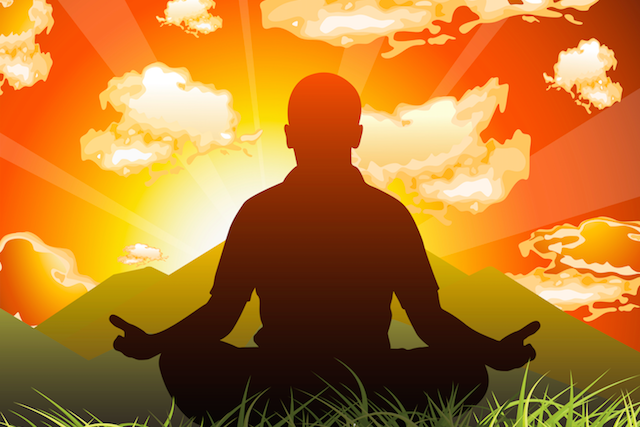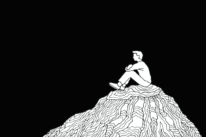
“In the midst of conscious suffering, there is already the transmutation. The fire of suffering becomes the light of consciousness.” ~Eckhart Tolle
I still remember the first day I met her.
I was running a bodywork clinic from home at the time, and she came to me one day for a treatment. Let’s call her Miranda.
Miranda had something about her that I noticed immediately, a palpable sense of peace and clarity that shone through her eyes and radiated out from her very core.
She seemed to be the most spiritually grounded person I had ever come across. I conveyed these impressions to her and asked if she had some sort of spiritual practice.
Indeed she did; in fact, she was what I would call a hardcore meditator.
For more than twenty years she had seated herself on her meditation cushion for three hours every morning from 4:00 to 7:00. I was incredibly impressed with her commitment to her practice, seeing as I had dabbled on and off in meditation for some years, but found it hard to commit to a regular habit.
After chatting about her practice for a while, I asked her to share the biggest benefit that regular meditation brought into her life. I saw a hint of sadness appear in her eyes as she proceeded to tell me her tragic story.
A few years earlier, her daughter, who was about eleven at the time, was diagnosed with a type of leukemia.
The prognosis was not good, and as a last resort, her doctors wanted to try an aggressive treatment that on the one hand could save her life, or on the other, could potentially result in severe side effects, perhaps even death.
It was up to Miranda and her husband to make the agonizing decision to go ahead with the treatment or not. Her daughter had been raised within a very healthy lifestyle, with mostly organic food and little exposure to chemicals, so Miranda felt worried about exposing her daughter to this intense therapy.
Eventually, Miranda and her husband came to the difficult conclusion that without the treatment she may die anyway, and so decided to go ahead with it. Sadly, her daughter did pass away after the treatment.
Miranda and her husband were overcome with unspeakable grief, but also a sense of guilt at having chosen a treatment that ultimately proved too much for her daughter’s body to bear.
Of course, it was no one’s fault that she passed, just a sad consequence, but nevertheless they were both riddled with guilt.
For some people, this kind of deep emotional trauma has the potential to destroy their lives forever.
Some people break in this kind of crisis never to feel whole again. And while Miranda spent most of her days after her daughter’s death consumed with pain and loss, she had the fortitude to continue with her daily meditation practice.
In those hours of stillness, she let herself surrender.
She surrendered to her pain, she embraced her grief and guilt fully, riding the waves of her deep emotions until her consciousness was able to drop even deeper, to that still, silent place within that is ever-present, but often obscured by the constant river of thoughts and feelings.
Those three hours of peace were Miranda’s lifeline and path to healing. They kept her sane, and they kept her strong for the rest of the family.
Of course, Miranda will always experience a sense of loss and sadness after losing her precious daughter, so please don’t think I am implying that meditation takes away the emotional pain in our lives or helps us to escape our feelings or problems. It doesn’t. But it does help us to get in contact with that part of ourselves that is beyond them.
Our lives are a series of changing experiences and external conditions that we deem “good” or “bad.” In order to avoid being at the mercy of this seeming chaos, it is essential that we understand the transient nature of our existence. As the Buddha famously said, “All of life is suffering.”
In other words, all things we hold dear will eventually disappear.
We look for happiness in our loved ones, our jobs, our possessions, our health and well-being, and our material wealth, but the great truth is that each of these things can and will be taken away from us eventually. Nothing is permanent in our world of form.
For this reason many of the great spiritual seekers that walked the Earth searched for what is real, or permanent, in our existence.
They discovered that beyond form, there is an awareness that we all possess that is spacious, calm, and still, and central to our true nature.
When we learn to access and live from this place within us, we are not so easily thrown around by the changing external conditions of our lives. We are able to meet life’s challenges with a sense of grace rather than resistance.
Miranda’s story and her palpable sense of peace left a lasting impression on me. I too wanted to search for the eternal, ever-present stillness that lies beneath the petty thoughts, feelings, and dramas of my conscious mind.
Thanks to her inspiring dedication, I made meditation a regular part of my life also. While I know that loss and emotional pain is as much a part of my human life as joy and happiness is, I have within me now an anchor at the center of my being that keeps me steady throughout life’s rough waters.
Man meditating image via Shutterstock
About Sharee James
Sharee James is a naturopath and a yoga and meditation instructor who has been leading spiritual retreats in the Himalayas of Nepal for the last 6 years. Check out her upcoming retreat to Nepal or sign up to her free online meditation course.
- Web |
- More Posts













 Though I run this site, it is not mine. It's ours. It's not about me. It's about us. Your stories and your wisdom are just as meaningful as mine.
Though I run this site, it is not mine. It's ours. It's not about me. It's about us. Your stories and your wisdom are just as meaningful as mine. 